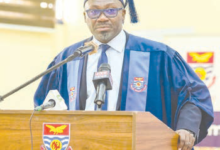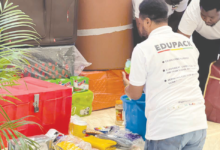STMA Health Directorate decry rising abortion among adolescent

The Metropolitan Health Directorate of Sekondi-Takoradi Metropolitan Assembly (STMA), has raised the alarm about the increasing rate of abortion among adolescent girls and called for urgent efforts by stakeholders, especially parents, to stem the trend.
“Some of these girls are sexually active. They are influenced by societal challenges and find themselves in this situation. As you go to church praying, your children are also doing their own thing.
You are in your room, but, your legs are outside. Let’s be concerned about our children whether boys or girls and educate them about sex life,” Deputy Director of Nursing Services (DDNS) for STMA Health Directorate, Mrs Angela Dadzie said on Thursday.
Giving more details, she said that the trend on abortions showed 79 cases in 2019, 84 in 2020 and 81 in 2021.
She gave this grim picture at a stakeholders’ engagement as part of community campaigns targeting youth in STMA under the European Union Twin Cities in Sustainable Partnership project.
Teenage pregnancy cases recorded in the Western Region for 2019 was 538, representing 6.8 per cent, 2020, 564 representing 7.2 per cent and 2021, 522, 7.0 per cent.
She continued “The trend showed that, in 2017 it was 13 .4 per cent, 2018, 12.4 per cent, 2019, 12.3 per cent, 2020, 11.9 per cent and 2021, 11.8 per cent.”
Mrs Dadzie revealed that in 2019 out of the 5,010 abortions recorded, 51 were adolescent between 10-14 years, one per cent, 658 between 15-19 years, 13 per cent whiles in 2020 out of the 4,628, abortions were 23, representing 0.1 per cent were between 10-14 years. We had 677 representing 14 per cent between 15-19 years.
In 2021, we recorded 5,178 pregnancies out of which abortions were 23 representing 0.4 per cent between 10-14 years and those from 15-19, we had 768, representing 15.2 per cent,” she added.
She attributed adolescent teenage pregnancies to lack of information and education about sexual and reproductive health and rights, inadequate access to services tailored to young people, family, community and social pressure to marry, sexual violence child, early and forced marriages and lack education for school drop-outs.
The DDNS said ignorance, lack of parental guidance, financial constraints, early engagement in sexual activities and sex as an adventure were other causes.
Mrs Dadzie said “Indeed, babies born to mothers under 20 year face higher risks of low birth weight, preterm delivery and severe neonatal conditions in some settings. Rapid repeat pregnancy is a concern for young mothers as it presents further health risks for both the mother and child.”
Other consequences, the DDNS pointed out, included blindness, deafness, bone deformities and intellectual ability, still birth and deformity in adolescent mother and that, socially, teenage pregnancy pose a health risk to both mother and child with an implication on cycles of poverty.
Mental conditions include low or sad mood, loss of interest in fun activities, change in appetite, sleep and energy, feeling worthless and feeling shame or guilt, Mrs Dadzie mentioned.
Chief of Fijai, Barima Ekow Gyesa III, recalled the powers given to assemblies to check funerals which drove into the night, saying ‘if that would not work, bring the laws back to chiefs.”
FROM CLEMENT ADZEI BOYE, SEKONDI






